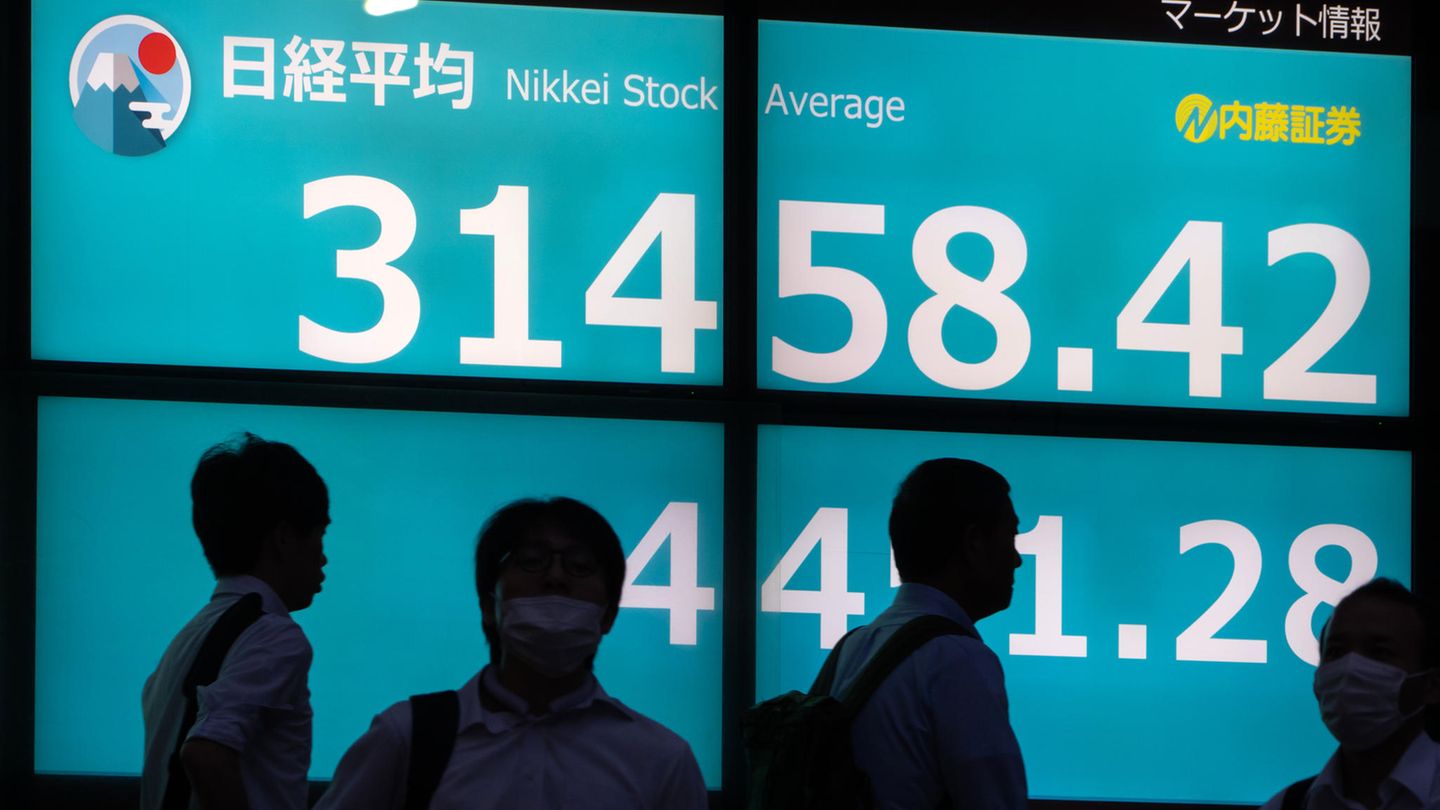In Asia, the leading stock market indices have already collapsed, DAX and cryptocurrencies are coming under pressure. What consequences does this have and what stock market experts are now advising investors.
Renewed fears of an economic crisis in the USA and fears of an escalation in the Middle East have triggered panic on the stock markets. The German leading index, the DAX, collapsed for the third time in a row on Monday. The stock market barometer had reached a record high of just under 18,893 points in May, but now the increase since the beginning of the year has shrunk to a meager few percent.
In Asia, where technology stocks plummeted, there was a renewed sell-off mood – this also spread to Europe. In addition to stocks, cryptocurrencies, which are considered highly speculative, were under strong selling pressure. Important questions and answers about the tense situation on the markets.
Where are the price losses particularly severe?
The Asian stock markets in particular were hit hard on Monday. The Nikkei 225 fell by 12.4 percent after the Japanese leading index had reached a historic high in mid-July. In Seoul, the South Korean leading index Kospi fell by almost 9 percent and in Taipei, Taiwan, the Taiex lost more than 8 percent. On a closing price basis, it was the largest daily loss ever seen. On the crypto market, Bitcoin collapsed to February levels.
What are the reasons for the price crash in Asia?
In Tokyo, it was primarily the recent significant rise in the national currency, the yen, that put a significant strain on the share prices of export-dependent Japanese companies. A strong yen tends to make the country’s exports more expensive. In Seoul and Taipei, technology stocks in particular suffered from a report that chip manufacturer Nvidia is postponing the launch of new AI chips due to so-called design defects. Nvidia was recently the driving force of the general stock market rally as a major beneficiary of the boom in artificial intelligence (AI).
Why are prices also falling in Europe?
One reason is that the cooling of enthusiasm for artificial intelligence (AI) has also removed one of the fuels for the recent rally on this side of the Atlantic. “Growth in the AI sector comes with enormous costs, which reduces companies’ margins and suddenly makes high stock valuations seem exaggerated,” wrote Jochen Stanzl, market analyst at trading house CMC Markets.
Investment ABC
No idea about stocks and funds? How to save your money
What role do central banks play?
According to Stanzl, the restrictive monetary policy of the European Central Bank and the US Federal Reserve is now having an effect. The major central banks, with the exception of the Japanese, had raised key interest rates sharply in recent years in order to control the high inflation resulting from the corona pandemic and the war in Ukraine.
Inflation is now largely under control, but the side effects of the drastic measures are now becoming apparent: the high interest rates have made investments and loans more expensive – and may have slowed economic growth beyond the level desired by the monetary authorities, observers fear. This was recently indicated by surprisingly weak labor market and sentiment data from the USA. Fears of a recession in the United States have grown. Since the USA is the largest economy in the world, an economic crisis there would burden many other countries.
What does the price drop mean for investors?
“First of all, strong nerves seem to be required,” wrote stock strategist Markus Reinwand from Landesbank Hessen-Thüringen. However, a correction, particularly in the highly valued technology stocks, could prevent the market from overheating in general. “Perhaps it helps to remember that stocks are a medium to long-term investment instrument,” the expert continued. After all, the DAX was temporarily below 3,600 points in 2009. At that time, investors on the stock market experienced the low point of the financial crisis; since then, the stock market barometer has almost quintupled.
How could central banks react?
The markets are speculating about significant or, as in the case of the US Federal Reserve, even extraordinary interest rate cuts in order to stimulate the economy. However, such an approach could – instead of providing reassurance – send prices further down the drain. Investors could interpret drastic and unexpected interest rate cuts as a sign that the economy is in an even worse state than previously thought.

Art as an investment: Art Advisor gives tips for beginners
05:09 min
What are the prospects for the stock market?
According to experts, nothing has changed in the fundamental attractiveness of the stock market, especially compared to fixed-interest bonds, which hardly yield any returns when inflation is taken into account. “We do not expect the current weak phase to be followed by a serious crisis lasting for a longer period,” said analyst Sören Hettler from DZ Bank optimistically. The profit expectations of the stock companies in the major indices for the next two years point to growth.
However, geopolitical pressures from the Middle East conflict could put further pressure on the markets. There is widespread fear that the potentially impending tough confrontation between Israel and its arch-enemies could have unforeseeable consequences for the region. This would not bode well for the stock market either.
Source: Stern




